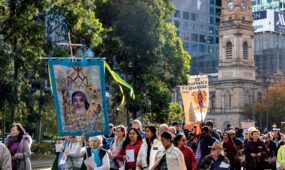Tackling the housing shortage
Opinion
I am going to throw my two cents worth into the discussion on the housing shortage and rental crisis in Australia. It’s a topic that was top of the agenda at the recent National Cabinet meeting in Brisbane, despite talk of a public holiday if the Matilda’s won the World Cup attracting much of the media attention in the lead up.

While the latter was a moot point and is no longer relevant, the housing shortage is very much a live issue and needs addressing urgently.
The Commonwealth Government has announced a $2 billion Social Housing Accelerator Program which includes $135.8 million for South Australia. Premier Malinauskas says it will help boost public housing to the tune of 300 to 400 new homes. But this won’t happen overnight, especially with the current delays in building supplies and lack of tradespeople.
Advertisement
Furthermore, the South Australian Commission of Social Services (SACOSS) estimates we would need to build around 1000 public housing dwellings each year to begin to rebuild the stock of social housing and put downward pressure on rental prices across the market.
There are those arguing for stronger regulation of landlords and a clamp down on Airbnb rentals while others insist that this will only deter investors and make the situation worse.
My contribution to the debate is based purely on personal experience.
In 2021 my father put our family home on the market after living there for 60 years. A widower, it was time for him to move into a smaller place in a nearby retirement village.
The house was on an average size block of land and quite liveable. But being a corner block there was scope for subdividing and building two houses (with no backyards), so not surprisingly it was purchased by a developer.
Sadly, our beloved family home was demolished within a few months of being sold. My four siblings and I were prepared for this, but it was still hard to see Mum’s beautiful garden – which Dad lovingly maintained for many years after her death – disappear in an instant.
The worst part, however, is that two years later the site remains empty. The developer clearly didn’t do his sums right and after getting approval for the subdivision has failed to sell the two blocks as either land or off-the-plan homes.
Not only are the poor neighbours left with an ugly vacant block of land next door or across the road, but a house that would have accommodated a large family or a group of young renters no longer exists.
It might not be so bad if the developer had kept the house and rented it until he or she had the capacity to redevelop the site.
With any new homes unlikely to be built on the site for some time, this is surely an example of poor public policy. I’m no expert on the housing or real estate industry but wouldn’t it make sense for there to be an appropriate penalty imposed if there is a delay in the start of building works after a home is demolished? That would at least force the developers to think about renting properties while they wait for the approvals, funds, buyers or whatever else they need to get things moving.
Advertisement
I imagine my dad’s house is not the only one like this. Homes on decent, or should I say normal, size blocks of land are snapped up by greedy developers before young couples can even think about whether they can afford them.
Here at the Archdiocese, we have received several emails via the website from families migrating to Australia asking if the Church can assist them with finding accommodation – either short or long term. This sort of request usually comes from refugees so imagine how tough it is for them now.
On another note, it always bothers me that there can be so many empty holiday homes – most of them way better than the average house – when there are people homeless.
That will never change, but what could make a difference is if more dioceses followed the lead of a small Tasmanian parish that recently teamed with CatholicCare Tasmania to transform vacant land into much-needed housing.
The partnership saw the demolition of a redundant presbytery and the construction of seven new homes for people on the priority social housing waitlist.
In Adelaide, Amélie Housing (a national community housing provider and work of the Society of St Vincent de Paul) has used a grant to purchase church land at Elizabeth North for 15-20 properties.
These two initiatives might be small but every little bit helps and I’m sure these types of partnership could be replicated in many places around Australia as church property assets continue to be consolidated.
There are no quick fixes to the housing shortage but it’s time to start thinking outside the square.







